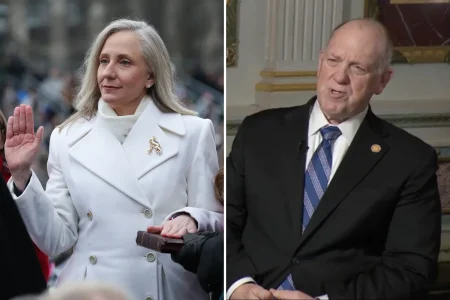House Votes to Table Controversial Censure Resolution Against Rep. Ilhan Omar
In a narrow, bipartisan vote of 214-213, the House of Representatives opted Wednesday to table a resolution that would have censured Rep. Ilhan Omar (D-Minn.) over comments she made following the assassination of conservative activist Charlie Kirk. The procedural vote effectively blocked the measure from receiving a full House vote, with four Republicans—Reps. Mike Flood (Neb.), Tom McClintock (Calif.), Jeff Hurd (Colo.), and Cory Mills (Fla.)—crossing party lines to vote with Democrats. This political maneuvering represents the latest chapter in the ongoing partisan tensions that have increasingly characterized congressional discourse, particularly when addressing matters of free speech and decorum among members.
The censure resolution, introduced as “privileged” by Rep. Nancy Mace (R-S.C.) on Tuesday, was a direct response to Omar’s comments in an interview with progressive news outlet Zeteo shortly after Kirk’s shooting death at a Utah college campus event. In that interview, Omar criticized Kirk’s past commentary, particularly regarding racial issues, stating he had “downplayed slavery and what Black people have gone through in this country by saying Juneteenth shouldn’t exist.” She further expressed frustration with those portraying Kirk as someone who merely wanted “civil debate,” noting that his “words and actions have been recorded and in existence for the last decade or so.” These remarks triggered immediate backlash from conservatives who interpreted them as disparaging a murder victim’s legacy at a moment when his family was grieving.
Rep. McClintock, one of the Republicans who voted to table the censure, offered a nuanced explanation for his position that highlighted the complex constitutional considerations at play. While he condemned Omar’s comments as “vile and contemptible” deserving “the harshest criticism of every man and woman of good will,” he defended his vote on First Amendment grounds. “This disgusting and hateful speech is still speech and is protected by our First Amendment,” McClintock told Fox News Digital. He further explained that censure represents formal punishment by the House, and Omar’s comments were not made in the House chamber and violated no House rules. His position reflects a principled stance that “a free society depends on tolerating ALL speech—even hateful speech—confident that the best way to sort good from evil is to put the two side by side and trust the people to know the difference.”
As the controversy unfolded, Omar pushed back against her critics, claiming her words had been taken out of context and stating that Kirk’s death was “mortifying.” She took to social media to clarify her position, writing, “While I disagreed with Charlie Kirk vehemently about his rhetoric, my heart breaks for his wife and children. I don’t wish violence on anyone. My faith teaches me the power of peace, empathy, and compassion.” She further accused “right-wing accounts” of spinning “a false story” despite her having “condemned his murder multiple times,” suggesting this was part of a broader agenda to “villainize the left” and deflect attention from what she characterized as Donald Trump’s divisive rhetoric. This back-and-forth exemplifies how tragedy can quickly become entangled in the polarized political discourse that defines contemporary American politics.
The resolution itself, as read aloud on the House floor by Rep. Mace, described Kirk as “a lifelong advocate for freedom of speech, civil political discourse and the political engagement of youth” and accused Omar of having “smeared Charlie Kirk and implied he was to blame for his own murder” in her Zeteo interview. Mace further alleged that Omar had reposted a video with inflammatory content about Kirk’s death. Fellow progressive lawmakers defended Omar, with Rep. Delia Ramirez (D-Ill.) pointing out on social media that the quotes attributed to Omar in discussions about the controversy were not direct quotations and had been presented without proper context, highlighting the importance of accuracy in such charged political moments.
The failed censure attempt against Omar is just one of several measures targeting the Minnesota representative over her comments. Rep. Buddy Carter (R-Ga.), who is currently running for Senate, introduced his own measure Monday seeking to strip Omar of her committee assignments. Meanwhile, a retaliatory censure effort against Rep. Mills, one of the Republicans who voted to table Omar’s censure, was dropped by House progressives after the Omar censure resolution failed. This tit-for-tat approach to congressional discipline underscores the increasingly personal nature of political conflict in Congress, where formal censure—once a rare and serious rebuke—has become another weapon in the partisan arsenal. As this particular episode fades, the underlying tensions that produced it remain unresolved, suggesting similar conflicts will continue to emerge as the nation navigates an era of profound political division.











